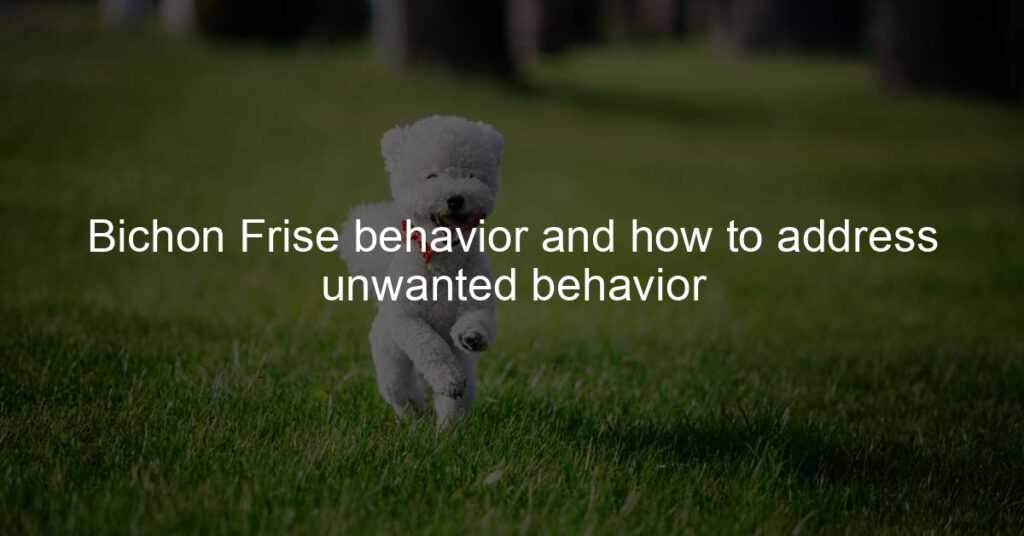As a bichon frise owner, you know that these lively little dogs make great companions. While they are generally easy to train and can be quite obedient, it’s not uncommon for them to develop unwanted behaviors. These normally include excessive barking, danger-seeking behavior, and actions such as nipping or chewing on furniture or items around the house.
Fortunately, there are steps you can take to address these behaviors in your pet and help keep your companion happy and well-behaved! Keep reading to learn more about common bichon frise behavior issues and discover how you can create an environment where good behavior is rewarded and bad habits are discouraged.
How do you discipline a dog for unwanted behavior?
Dogs are a lot of fun companions, but sometimes their behavior can get out of hand. It’s important to understand how to discipline a dog for unwanted behavior. One way to do this is with positive reinforcement – reward wanted behaviors with treats or verbal praise, and ignore the unwanted behaviors.
Negative reinforcement can also work well – loud noises and short withdraws from affection have proven effective in helping teach dogs that certain behaviors are off-limits. However, it’s crucial in any form of disciplinary action to ensure your pup knows you love them no matter what, as forming a secure bond with your pup will make training easier in the long run.
How do you calm down a Bichon Frise?
Bichon Frises can be very energetic fur babies, but with the right techniques, it’s easy to calm them down. Like any dog breed, a calm owner sets the example for the pup. Stay relaxed and consciously avoid raising your voice or energy level when speaking to them – this will help to keep them from getting too excited.
It’s also important to give plenty of attention whenever possible; if they are misbehaving, attempting to seek attention, or feel ignored, try redirecting their focus to something else such as giving them a toy or teaching them new commands. With a few effective approaches, the loving Bichon Frise that you know and love will remain happy and relaxed in no time.
Why are bichons so stubborn?
Bichons, like most dogs, can be very stubborn – but why? Bichons have unique personalities; they’re known to be friendly, loyal, and affectionate. But the same traits that make them such great companion pets may also contribute to their stubbornness. They don’t always like to accept orders from their owners, making them difficult to train at times. Furthermore, they have a strong sense of independence and are always eager for attention and praise.
This can lead bichons to challenge authority if they don’t get what they want right away – or in the way that they prefer. Ultimately, though, bichons want to love and comfort just like any other dog – it’s just their determination, persistence, and zest for life that sometimes makes them appear more stubborn than the average pup!
Why does my Bichon growl at me?
Dogs are generally sweet and most of them want to love and be loved, but sometimes our furry best friends show their displeasure with us -like when your Bichon growls at you! A pet may growl for a variety of reasons- they might be feeling scared or threatened – maybe something is spooking them in the room; they could also simply be communicating that they don’t like what you’re asking them to do. It’s important to try to identify why your pooch is growling before attempting to correct the behavior.
First of all, eliminate any possible threats and fears in the environment, then try changing up situations that cause stress or discomfort for your pup – for example, if your pup often growls when brushed or parked on the grooming table, slowly reintroduce these things back into his environment over time in short sessions punctuated with treats and praise – this will help build trust and reinforce positive behaviors.
What are the negatives of a Bichon Frise?
When it comes to Bichon Frise puppies, they may be irresistibly cute, but there are some negatives you need to be aware of when considering whether to adopt one. They can be little divas who are very demanding of attention and if you don’t provide it on cue they are known to throw a fit.
Another downside is that the breed has a high rate of allergies or skin problems to watch out for. Bichons also have thick fur coats which require regular trips to the groomer and constant brushing–which can add up in time and effort–so be sure you’re prepared for this commitment. Of course, while they live shorter lives than other breeds, they still deserve lots of love and tender care well into their old age!
Conclusion: Bichon Frise behavior and how to address unwanted behavior
There is a lot to consider when it comes to managing and understanding behavior in Bichon Frises. Patience, consistency, and clear boundaries are important for a successful relationship with these wonderful dogs. Exercise, mental stimulation, and training can help them learn the behaviors they want and avoid any that they don’t.
Don’t forget that these fluffy little dogs still require proper socialization – introduce new experiences gradually and slowly to ensure they know how to react in different situations. If you ever have questions or run into problems, don’t forget that there are resources available online through forums, blogs, and websites dedicated to educating people on dog care – including Bichon Frise behavior!
With patience and careful monitoring of Bichon Frise’s behavior, you can enjoy all the advantages of owning one of these delightful little companions – and avoid some of their behavioral issues along the way.








